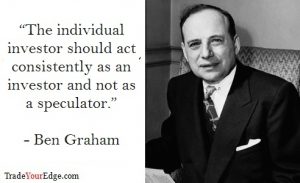 Warren Buffett is referred to as the “Sage” or “Oracle” of Omaha (the largest city in the state of Nebraska, United States), he is viewed as one of the most successful investors in history. He followed the principles set out by Benjamin Graham. Now let me briefly introduce you to Benjamin Graham. He is considered the father of value investing, an investment approach he began teaching at Columbia Business School in 1928 and subsequently he co-authored with David Dodd through various editions of their famous book Security Analysis. Warren Buffett thoroughly follows Benjamin Graham’s principles and illustration on investments.
Warren Buffett is referred to as the “Sage” or “Oracle” of Omaha (the largest city in the state of Nebraska, United States), he is viewed as one of the most successful investors in history. He followed the principles set out by Benjamin Graham. Now let me briefly introduce you to Benjamin Graham. He is considered the father of value investing, an investment approach he began teaching at Columbia Business School in 1928 and subsequently he co-authored with David Dodd through various editions of their famous book Security Analysis. Warren Buffett thoroughly follows Benjamin Graham’s principles and illustration on investments.
While studying his graduate studies at Columbia, Warren Buffett was the only student ever to earn an A+ in one of Graham’s classes. But, both Ben Graham and Warren’s father advised him not to work on Wall Street after he graduated. Warren Buffett was so determined to start his work soon after graduation that he offered to work for the Benjamin Graham’s partnership for free. Ben turned him down. He preferred to hold his spots for Jews who were not hired at Gentle/goof firms at the time. Warren was crushed. Returning home, he took a job at his father’s brokerage house.
Graham, who is well known as Warren Buffett’s mentor, learnt his investment lessons with many obscurities; his losses in the stock market crash of 1929 and the subsequent bear market during the Great Depression led Graham to sharpen his investment techniques. These techniques sought to profit in stocks while minimizing downside risks. He did this by buying shares of companies whose shares traded far below the companies’ liquidation value. In simple terms, his goal was to buy a dollar’s worth of assets for 50 cents, and he did that very well, both in theory and in practice. There were two general ways that Graham used to do this. The first method was the use of market psychology; that is, using the fear and greed of the market to earn profits and the second was to invest by the numbers.
stock market crash of 1929 and the subsequent bear market during the Great Depression led Graham to sharpen his investment techniques. These techniques sought to profit in stocks while minimizing downside risks. He did this by buying shares of companies whose shares traded far below the companies’ liquidation value. In simple terms, his goal was to buy a dollar’s worth of assets for 50 cents, and he did that very well, both in theory and in practice. There were two general ways that Graham used to do this. The first method was the use of market psychology; that is, using the fear and greed of the market to earn profits and the second was to invest by the numbers.
Like his mentor, Warren Buffett restricts himself to businesses he can fairly understand and analyze. Investment success is not a matter of how much you know but rather how sensibly you define what you know and what you don’t know. Buffett considers this wisdom of understanding for the operating business. It is a prerequisite for a feasible forecast of future business performance. After all, if you don’t understand the business, how can you project performance? Buffett’s each business beliefs support the goal of producing a robust projection. First, analyze the business, not the market or the economy or investor sentiment. Next, look for a consistent operating history. Finally, use that data to ascertain whether the business has positive long-term prospects or not.
 Warren Buffett has amassed a personal multibillion dollar fortune mainly through investing in stocks and buying companies through Berkshire Hathaway. Shareholders in Berkshire Hathaway who invested $10,000 in the company in 1965 are above the $50 million mark today. Now in his 80s, Warren Buffett has yet to write a single book, but among investment professionals and the investing public, there is no more respected voice.
Warren Buffett has amassed a personal multibillion dollar fortune mainly through investing in stocks and buying companies through Berkshire Hathaway. Shareholders in Berkshire Hathaway who invested $10,000 in the company in 1965 are above the $50 million mark today. Now in his 80s, Warren Buffett has yet to write a single book, but among investment professionals and the investing public, there is no more respected voice.
His advice to the world of investors is very straightforward “be wise while investing but don’t fall in love with your stocks” In one of his interviews on CNBC which lasted for about 3 hours he shared his wisdom with the world which is worth million dollars. The excerpts are as follows:
1. Don’t let world events affect your investments
Warren Buffett says even if you realize a big war is about to take place and is unavoidable, still buy stocks. You’re going to invest your money in something over time. One thing you can be sure of is if a war broke, the value of money would go down. … That happens virtually in every war. The last thing anybody should do is hold money during a war; because after the war you might want to own a farm, you might want to own an apartment house, you might want to own securities. By holding you money without investing it somewhere, you are simply declining its growth. During World War II the stock market advanced. The stock market will have its ups and downs as it is, but eventually it is going to advance some time.
2. Don’t get affected when your stocks go down
Warren Buffett only likes to buy stocks for a lot less than he thinks they are really worth, this suggests you can get a bargain or two—although, as always, there is no guarantee. Instead when your stocks go down, buy more. Some day they have to be revived. Precision in stocks is just not possible. Have patience; give some time to your investment. Get associated with your stocks by watching their movement.
3. You don’t have to be an expert
The stock market offers you so many opportunities to invest in thousands and thousands of different businesses. You don’t have to be an authority on every one of them. You don’t need to be an expert on 10 percent of them even. You just have to have some conviction that a given company or a group of companies are likely to make more money 5, 10 or 20 years down the line from now on. Read up, gather information, discuss with your friends, some professional and that is not so difficult to make a decision. Warren Buffett advices to be watchful and use common sense; and if you have no expertise at all, Warren Buffett recommends a low-cost index fund. Keeping costs to a minimum is enormously important in investing. If you’re in effect paying out 1 or 2 percent annually of your portfolio, that’s a big tax that you don’t have to pay.
thousands of different businesses. You don’t have to be an authority on every one of them. You don’t need to be an expert on 10 percent of them even. You just have to have some conviction that a given company or a group of companies are likely to make more money 5, 10 or 20 years down the line from now on. Read up, gather information, discuss with your friends, some professional and that is not so difficult to make a decision. Warren Buffett advices to be watchful and use common sense; and if you have no expertise at all, Warren Buffett recommends a low-cost index fund. Keeping costs to a minimum is enormously important in investing. If you’re in effect paying out 1 or 2 percent annually of your portfolio, that’s a big tax that you don’t have to pay.
4. Don’t go for immediate gratification of quick profits
- Generally speaking, everyone is interested in making a quick profit and there’s no law against making quick profits. But while investing one needs to be wise; invest in stocks of companies which are there to stay, not the ones who are established for cheating investors. Grow with the company you have invested in. Don’t make money by selling the company. … The answer isn’t to sell the company. The answer is to keep running the company well. Take pride in your stocks; see the growth of the companies, therefore, understand its revenue, expenses, growth potential, assets, liabilities, and a host of other information.
5. Bulls markets are fun for little time
Warren Buffett warns against the whimsical and irrational bullish market behavior of stock market. Prices in the bullish face make an investor “behave irrationally as well” he says. He also urges nervous or beginners in investment against going into stocks at a time of extreme exuberance and becoming disillusioned when paper losses occur. A Bull market is when everything in the economy is great, people are finding jobs, gross domestic products (GDP) is growing, and stocks are rising. Things are just plain rosy! Picking stocks during a bullish phase is easier because everything is going up. Bull markets cannot last forever though, and sometimes they can lead to dangerous situations – especially when stocks become overrated. If a person is optimistic and believes that stocks will go up, he or she is called a “bull” and is said to have a “bullish outlook”.
behavior of stock market. Prices in the bullish face make an investor “behave irrationally as well” he says. He also urges nervous or beginners in investment against going into stocks at a time of extreme exuberance and becoming disillusioned when paper losses occur. A Bull market is when everything in the economy is great, people are finding jobs, gross domestic products (GDP) is growing, and stocks are rising. Things are just plain rosy! Picking stocks during a bullish phase is easier because everything is going up. Bull markets cannot last forever though, and sometimes they can lead to dangerous situations – especially when stocks become overrated. If a person is optimistic and believes that stocks will go up, he or she is called a “bull” and is said to have a “bullish outlook”.
The remedy to that kind of mistiming is for an investor to accumulate shares over a long period and never sell when the news is bad and stocks are well off and elevated. Warren Buffett’s bottom line fundamental advice: “Ignore the gossip, keep your costs minimal, and invest in stocks as you would in a farm.” He also advises investors forming macro opinions or listening to the macro or market predictions of others is a waste of time.
 Some of the illustrative investments that fuelled Warren Buffett’s (Berkshire Hathaway) fortune include the kinds of companies that he called ‘inevitables’ they are cash generative brands such as Gillette, Coca Cola and American Express. In the case of American Express, Berkshire first bought its shares in the company in 1964, adding weight to one of the Sage’s famous observations; in his words “our favorite holding period is forever.”
Some of the illustrative investments that fuelled Warren Buffett’s (Berkshire Hathaway) fortune include the kinds of companies that he called ‘inevitables’ they are cash generative brands such as Gillette, Coca Cola and American Express. In the case of American Express, Berkshire first bought its shares in the company in 1964, adding weight to one of the Sage’s famous observations; in his words “our favorite holding period is forever.”












































